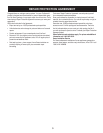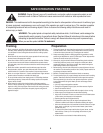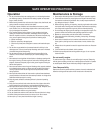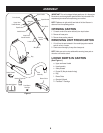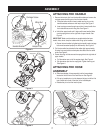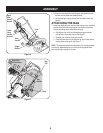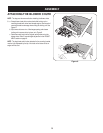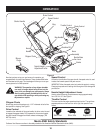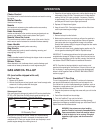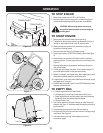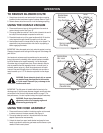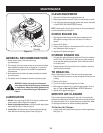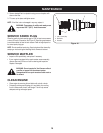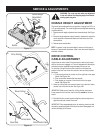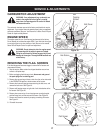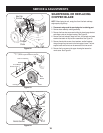
11
OPERATION
Choke Control
The choke control is used to choke the carburetor and assist in starting
the engine.
Starter Handle
Used to start the engine.
Nozzle
Yard waste such as leaves or pine needles can be vacuumed up
through the nozzle for shredding.
Hose Assembly
Used as an alternative to the nozzle to vacuum yard waste such as
leaves or pine needles in hard to reach places. See Figure 9.
Nozzle/ Hose Vac Lever
The nozzle/hose vac handle is located on top of the nozzle. Use it to
switch vacuum suction between the nozzle and the hose assembly.
Hose Handle
Used to guide hose assembly when vacuuming.
Bag Handle
Used to grasp bag in order to assist in attaching, removing, and
emptying bag. See Figure 9.
Bag
Collects shredded material fed through the chipper chute or vacuumed
through the nozzle or hose.
Blower Chute
When attached to unit, the blower chute is used to discharge yard
waste such as leaves, pine needle, or small twigs across yard.
GAS AND OIL FILL-UP
Oil (one bottle shipped with unit)
First Time Use
1. Remove oil fill dipstick.
2. With the Yard Vacuum on level ground, use a funnel to empty entire
contents of oil bottle provided into the engine.
3. Replace oil fill dipstick and tighten.
Subsequent Uses
Only use high quality detergent oil rated with API service classification
SF, SG, or SH. Select the oil’s SAE viscosity grade according to the
expected operating temperature. Follow the chart below.
Although multi-viscosity oils (5W30, 10W30, etc.) improve starting
in cold weather, they will result in increased oil consumption when
used above 32°F. Check your engine oil level more frequently to avoid
possible engine damage from running low on oil.
1. Check the oil level making certain not to rub the dipstick along the
inside walls of the oil fill tube. This would result in a false dipstick
reading. Refill to FULL mark on dipstick, if necessary. Capacity
is approximately 18 oz. Overfilling will cause the engine to smoke
profusely and will result in poor engine performance.
2. Replace oil fill dipstick and tighten.
3. Keep oil level at FULL. Running the engine with too little oil can
result in permanent engine damage.
Gasoline
1. Remove fuel cap from the fuel tank.
2. Make sure the container from which you will pour the gasoline is
clean and free from rust or foreign particles. Never use gasoline
that may be stale from long periods of storage in its container.
Gasoline that has been sitting for any period longer than four weeks
should be considered stale.
3. Fill fuel tank with clean, fresh, unleaded regular gasoline only. Do
not use gasoline containing METHANOL. Replace fuel cap.
IMPORTANT: To avoid engine problems, the fuel system should be
emptied before storage for 30 days or longer. Drain the fuel from the
tank by running the engine until the fuel tank is empty. Use fresh fuel
next season. See STORAGE section for additional information.
NOTE: Check the fuel level periodically to avoid running out of
gasoline while operating the Yard Vacuum. If the unit runs out of gas
as it is chipping, it may be necessary to unclog the discharge area
before it can be restarted. Refer to SERVICE AND ADJUSTMENT
section on page 17.
FreshStart™ Gas Cap
This unit is equipped with a FreshStart™ continuous fuel preserver
gas cap which automatically drips continuous fuel preserver into
your fuel tank for up to six months depending on conditions, such as
temperature, usage patterns, fuel type and blend. To activate the gas
cap, follow the instructions below:
1. Snap the fuel preserver cartridge that comes with your unit into the
fuel cap.
2. Peel off the white tab from the cartridge.
3. Twist the FreshStart™ cap onto the fuel tank.
When you visually see that the fuel preserver cartridge is empty,
replacement cartridges are available through your local Sears Parts &
Repair Center and most Sears stores.
WARNING: Use extreme care when handling
gasoline. Gasoline is extremely flammable and the
vapors are explosive. Never fuel machine indoors
or while the engine is hot or running. Extinguish
cigarettes, cigars, pipes, and other sources of
ignition.
/IL6ISCOSITY#HART
7
#OLDER
7ARMER
3!%
&



